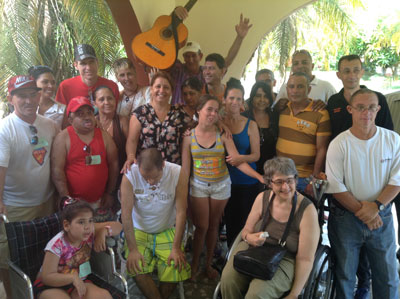A letter from Josefina Saez-Acevedo serving in Cuba
March 2017
Write to David Cortes-Fuentes
Write to Josey Saez-Acevedo
Individuals: Give online to E200519 for David Cortes-Fuentes and Josey Saez-Acevedo’s sending and support
Congregations: Give to D507587 for David Cortes-Fuentes and Josey Saez-Acevedo’s sending and support
Churches are asked to send donations through your congregation’s normal receiving site (this is usually your presbytery).
Let us introduce you to Magalys Herrera Pérez, a member of the Reformed Presbyterian Church in Remedios, Cuba. To meet Magalys is to meet a person whose hope for life wells up from her personal relationship with Jesus Christ, the giver of hope. We met Magalys last fall at a gathering in our home where several Presbyterian Seminary students came to a “Meet and Greet” group visiting from Tres Rios Presbytery. Each student had the opportunity to introduce himself or herself. When it came to Magalys, everyone instantly wanted to know more about her and the ministry with persons with disabilities about which she spoke with such passion. Magalys is a nurse by profession, working at the local hospital in her town. As such, she comes into contact with many families and their children. She works primarily with children living with a variety of disabilities. She feels so deeply for these parents and their children because she too is a parent with a child facing a cognitive disability.
She shares that as a Christian nurse, her faith and love for God plays a central role in her life and work. In the Cuban context being a Christian is not something readily made public. Especially when one is employed by the “State” in professions of service such as in the medical arena. But Magalys does not keep her faith a secret at all. She exudes her love for her profession and that of Christ. She tries to make a difference in the lives of all those in her care. She quietly prays with and for all her patients as she goes about her day at the hospital. Because of this she has felt motivated to come to seminary, not to become a pastor as such, because, as she told me, she is already a “pastor” to all those she comes in contact with at the hospital. Her community is all those she encounters every day in her work. In a sense Magalys is an “undercover chaplain.” Hospital chaplaincy is not part of the Cuban context. Yet many men and women of faith, just like Magalys, do the work of chaplaincy quietly and with great love.
Magalys has taken the care for these parents and their disabled children a step further. She has opened her home to provide a space where they can celebrate life. Her home provides a space for rest, sharing, and celebration. Magalys plays an integral role in a program called “Redes de Esperanzas” (Nets of Hopes), which is an ecumenical social and community outreach program for families and persons with cognitive disabilities. The space she provides in her home is called “Suenos y Esperanzas” (Dreams and Hopes). Many, if not all of these parents, feel alone, beaten down and tired. The children who participate in the program have not had a space provided for them where they can socialize and develop friendships. She shares the satisfaction of seeing the group gather in celebration of monthly birthdays, which is the highlight of their time together. She told us that not one of these children has had a birthday celebration before. “To see the faces of these children and parents light up with that of friendship, solidarity and hope is a sight to be seen,” she says. This space is not only for the children, but a time for parents to share their burdens and concerns as well. As a nurse, she advises parents how to care for themselves and their loved ones. Some parents are apprehensive at first because they do not want to take part in anything “religious.” Magalys reassures them to come as they are. They do, and they stay because they sense God’s love through mutual respect, not religion.
This is but one of the many shared instances of agape love shown through selfless service to others all over Cuba by an ecumenical effort. Magalys, David and I want you to know that God is working through and among the people of Cuba. Through acts of kindness, such as creating community for those living with cognitive disabilities and on the margins of society, Redes de Esperanza was recently at the Seminary for a two-day training to equip “Amigos Dispuestos” (Able Friends) to go out to serve their communities as far as La Habana to Santiago de Cuba. Truly, it is the Priesthood of all Believers.
If I say, “I will not mention him,
or speak any more in his name,”
there is in my heart as it were a burning fire
shut up in my bones,
and I am weary with holding it in,
and I cannot (Jeremiah 20:9).
David & Josey
![]() You may freely reuse and distribute this article in its entirety for non-commercial purposes in any medium. Please include author attribution, photography credits, and a link to the original article. This work is licensed under a Creative Commons Attribution-NonCommercial-NoDeratives 4.0 International License.
You may freely reuse and distribute this article in its entirety for non-commercial purposes in any medium. Please include author attribution, photography credits, and a link to the original article. This work is licensed under a Creative Commons Attribution-NonCommercial-NoDeratives 4.0 International License.

